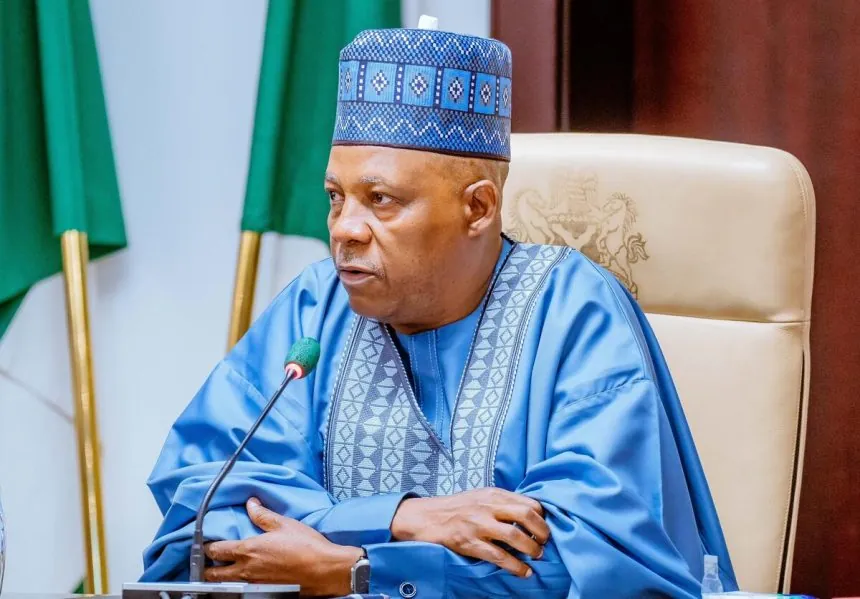National News
Presidency Denies Link Between Shettima’s Remarks and Rivers State Political Crisis

The Presidency has strongly dismissed speculations and reports circulating online that seek to tie Vice President Kashim Shettima’s recent public remarks to the current political situation in Rivers State, branding the narratives as completely baseless, misleading, and a distortion of facts.
In a statement issued late Thursday evening by Stanley Nkwocha, Senior Special Assistant on Media & Communications to the President (Office of the Vice President), the Presidency said it has observed with growing concern the deliberate misrepresentation of Vice President Shettima’s speech at a public book launch held in Abuja. The book, “OPL 245: The Inside Story of the $1.3 Billion Oil Block”, authored by former Attorney General of the Federation and Minister of Justice, Mohammed Bello Adoke (SAN), was presented at the Shehu Musa Yar’Adua Centre on Thursday, July 10, 2025.
According to the statement, some online platforms and individuals with vested interests have twisted Shettima’s speech, especially the portion where he referenced how the administration of former President Goodluck Jonathan once contemplated removing him as Borno State Governor during the height of the insurgency in the North-East. The distortion, the Presidency said, is being used to falsely suggest that the Vice President was criticizing President Tinubu’s recent actions regarding Rivers State.
“This pattern of reporting is not only sensational but dangerously irresponsible,” Nkwocha said. “The Vice President’s remarks were shared in the spirit of reflection and historical context—not as a commentary on ongoing political decisions.”
Remarks Were Historical, Not Political
The statement clarified that Vice President Shettima’s intention was to commend the author, Adoke, for his professional conduct during a very delicate period in Nigeria’s political history. His speech also served as a reflection on how Nigeria has navigated complex constitutional challenges in the past, including moments of federal-state tensions and national security threats.
“The reference to the events of the Jonathan administration was a retrospective analysis meant to show how public institutions have evolved in their responses to governance breakdowns,” the statement noted.
It added that the Vice President merely shared personal experiences to underscore how governance crises were managed then, without drawing any comparison or correlation to the political events currently unfolding in Rivers State.

Tinubu’s Intervention in Rivers Based on Constitution
Setting the record straight, the Presidency emphasized that President Bola Ahmed Tinubu’s action in Rivers State—namely the suspension of Governor Siminalayi Fubara from office—was taken within the full bounds of the Constitution. The decision followed a critical breakdown of governance in the state, marked by prolonged political tensions, attempted impeachment, and even the demolition of the State House of Assembly complex, which led to security threats and administrative dysfunction.
“There was an urgent need to act to restore stability, and President Tinubu acted responsibly within the constitutional framework,” Nkwocha said.
He referenced Section 305(3)(c) of the 1999 Constitution (as amended), which allows for extraordinary federal intervention when there is a serious breakdown of law and order that threatens the safety and stability of any part of the Federation.
The declaration of a state of emergency in Rivers, he explained, was not an act of political vendetta but a constitutional move, backed by intelligence reports and necessitated by the worsening situation.
Suspension, Not Removal
Nkwocha stressed that contrary to public perception and false narratives, Governor Fubara was not removed from office, but rather suspended from performing the duties of his office due to the volatile political climate and failure to maintain order.
Recommended News:
- Why Ofin Deserves Remo Federal Constituency Seat – A Case For Political Fairness, Inclusiveness And Equity In Remo
- Missing N210tn: NNPCL GCEO Bayo Ojulari Shuns Senate Again, Lawmakers Fume
- Tension in Nasarawa As Suspected Herdsmen Kill ‘Iron Money’, Injure Police Officer In Kadarko Attack
“To equate suspension with removal is both legally inaccurate and politically mischievous. The distinction is important and must be clearly understood,” the Presidency’s statement emphasized.
The statement noted that this measure, approved by an overwhelming majority in the National Assembly, was a product of bipartisan consensus and should not be misunderstood or mischaracterized as executive overreach.
Averting a Full-Blown Crisis
The Presidency defended President Tinubu’s swift intervention, stating that it prevented a total collapse of governance in Rivers State. Had the suspension not taken place, the situation could have escalated into a constitutional and security emergency beyond repair.
“There were reports of targeted attacks on federal institutions, coordinated violence, and widespread disruption of governance activities. In any functioning democracy, such developments demand urgent and lawful action,” Nkwocha asserted.
He further emphasized that the suspension of Governor Fubara, along with other implicated officials, helped to diffuse tension and return calm to the state—a development that could not have been achieved through inaction.
Shettima Fully Behind Tinubu
Dismissing claims of division within the Presidency, Nkwocha reiterated that Vice President Shettima remains solidly behind President Tinubu and supports all measures taken to protect the unity and stability of Nigeria’s democracy.
“There is no rift, no disagreement. The Vice President remains a loyal and committed partner in governance and nation-building,” he said.
The statement also noted that Shettima’s speech was made off-script and in good faith, intended to promote the culture of documentation, transparency, and accountability in public service. His references to the past were not criticisms, but reflections on leadership during challenging times.
Media, Political Players Cautioned
In a firm closing remark, the Office of the Vice President called on media outlets, journalists, bloggers, and political commentators to refrain from spreading half-truths, taking remarks out of context, or manufacturing divisions that do not exist.
“Such acts not only undermine public trust but also erode the fabric of responsible journalism and democratic dialogue,” the statement warned.
The Presidency urged the public to seek out full and verified context when interpreting statements from public officials, especially in an era where misinformation spreads rapidly and can lead to unnecessary public tension.




















